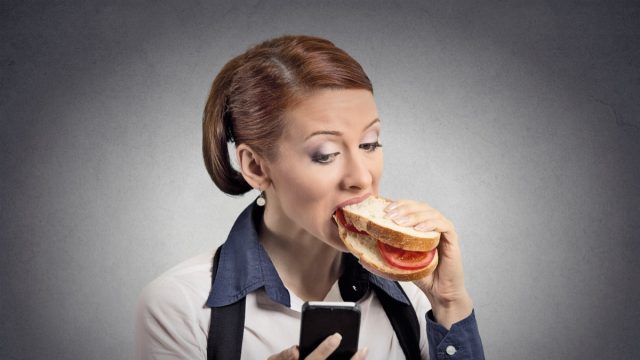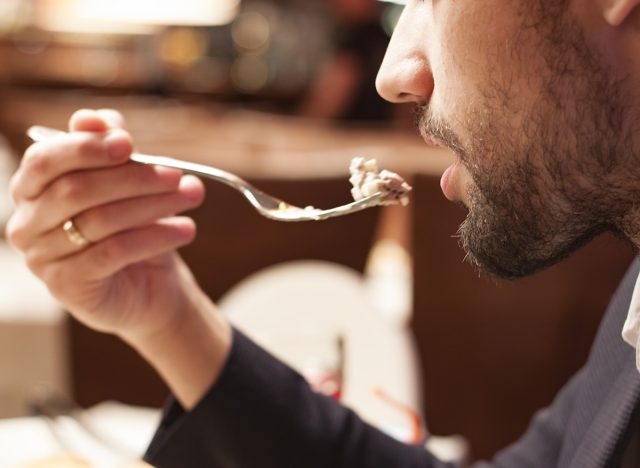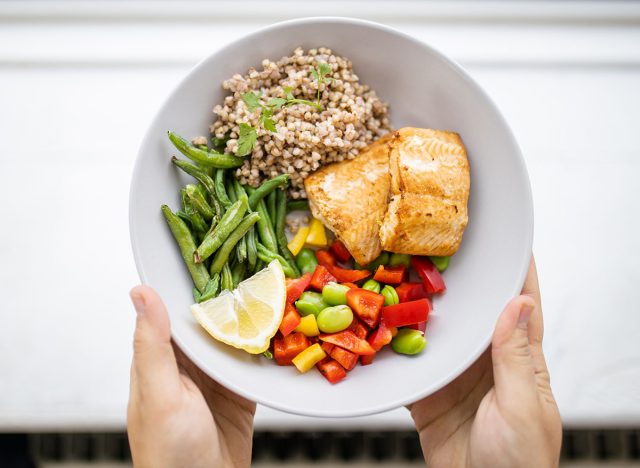What Happens to Your Body When You Stop Eating While Distracted

Is eating while distracted undermining your diet and your health? "If you are worried about your weight, paying more attention to what you eat, not less, could help keep you from overeating," Howard E. LeWine, MD, says via Harvard Health. "Multitasking—like eating while watching television or working—and distracted or hurried eating can prompt you to eat more. Slowing down and savoring your food can help you control your intake."
Weight Loss

If you're eating mindfully and without distraction, it's easier to pick up on signals of 'fullness' from your body and lose weight. "If you eat slowly, you are more likely to recognize when you are feeling satisfied, or when you are about 80% full, and can stop eating," says Harvard T.H. Chan School of Public Health.
Enjoying Food

You can't really appreciate how delicious your food is if you're speed-eating while watching a TV show, or eating at your desk. "Notice the sounds, colors, smells, tastes, and textures of the food and how you feel when eating," says Harvard T.H. Chan School of Public Health. "Pause periodically to engage these senses."
Healthier Choices

Eating without distraction may help with choosing healthier options that actually take time and attention to prepare. "Keep healthy food choices, such as fruits and vegetables, readily available in cabinets, cupboards, and the refrigerator to encourage mindful healthy eating habits," says Utah State University.
Practicing Gratitude

Eating mindfully gives you a chance to truly appreciate your food. "Pause for a minute or two before you begin eating to contemplate everything and everyone it took to bring the meal to your table," says Harvard Health. Silently express your gratitude for the opportunity to enjoy delicious food and the companions you're enjoying it with."
Hunger Cues

Eating without distraction can prevent mindless snacking. "Mindful eating can be a useful tool that aids in focusing on present thoughts and feelings as you eat," according to Utah State University. "By employing mindful eating techniques, you have the opportunity to change your current eating habits by becoming more self-aware and in tune to your body's hunger and fullness cues."
Portion Size Awareness

By slowing down and enjoying your food, you will also know how to approach portions in the future. "The benefits of mindful eating include making healthier choices, slower rate of eating, awareness of portion sizes, eating less by listening to our bodies hunger and satiety cues, enjoying food more, and increased satisfaction after eating," Christine McKinney, RD LDN CDE, tells Johns Hopkins. 'These benefits will also improve glycemic control."
RELATED: I Got Into the Best Shape of My Life at 50 by Following These 6 "Basics"
Chewing More

If you're not distracted, you can actually focus on your food and every bite. "Chew well until you can taste the essence of the food," says Harvard Health. "(You may have to chew each mouthful 20 to 40 times, depending on the food.) You may be surprised at all the flavors that are released."
Better Relationship With Food

Eating while focused and present can change your relationship with food for the better. "Mindful eating opens up an opportunity to appreciate food more and make a better connection with it," says the British Dietetic Association (BDA). "Some studies suggest that mindful eating can help support emotional eating and binge eating, promoting a healthier relationship with food."
No Discomfort

By paying attention to hunger and fullness cues, you can help avoid discomfort. "Don't stuff yourself," says Utah State University. "It is okay to leave food on your plate. Stop eating when you feel full, save leftovers for later, or throw out the last few bites."
RELATED: I Lost Over 90 Pounds After Years of Trying to Lose Weight the "Wrong Way"
Better Digestion

If you're eating without distraction, chances are you will eat more slowly, especially if you're sharing a meal with friends. This is good for digestion and will make you feel better than if you wolfed all your food down in a hurry. And if you enjoyed this article, take advantage of these 15 Quick Ways to Lose Body Fat Percentage in a Week.




